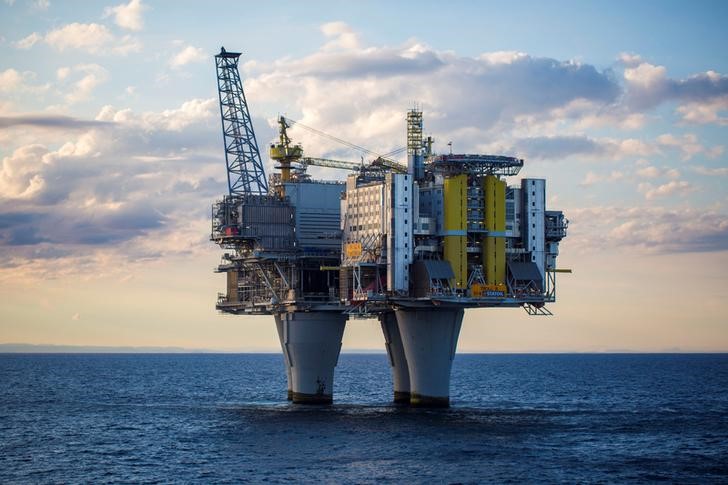By Marianna Parraga and Deisy Buitrago
HOUSTON/CARACAS (Reuters) – The day after the United States announced it would reimpose costly restrictions on Venezuela’s oil sector, the South American country braced for the fallout, warning its president that the “serious mistake” would also would affect American interests.
Announced Wednesday by U.S. officials, Venezuela’s loss of a key U.S. license that allowed the country to export freely and increase investment in its oil sector will hit the volume and quality of its crude oil and fuel sales, while it will lead to a wave of requests for individual clearances for US deals. .
Washington had warned that it would not renew the so-called License 44 if President Nicolas Maduro did not make progress towards implementing an electoral roadmap agreed with opposition leaders last year that aimed to guarantee free and fair elections this year .
Speaking at the headquarters of state oil company PDVSA in Caracas, Maduro criticized US President Joe Biden’s administration for making good on its “threat of blackmail” in a speech broadcast on state television.
“While you are trying to harm us, President Biden, you are doing double harm to yourself as Venezuela continues to follow its own path,” he said, flanked by PDVSA workers.
Last October, the permit eased oil sanctions that had been in place for the past five years against OPEC member Venezuela, once Latin America’s largest oil producer.
On Wednesday, U.S. officials gave companies 45 days to complete pending transactions under a more restrictive license called 44A.
This period could allow the departure of some oil supertankers chartered by PDVSA customers that have waited months to load in Venezuela, but others may need individual U.S. authorization to complete their purchases.
Remove ads
.
Venezuelan officials argue that the sanctions had little effect domestically but would damage efforts to normalize bilateral ties and harm U.S. interests in Venezuela’s oil industry.
Washington said on Wednesday it would process specific authorization requests for doing business with Venezuela, a commitment Venezuelan officials said they expect the US to honor.
Permits previously granted to oil companies, including Chevron (NYSE:), Repsol (OTC:) and Eni were not withdrawn, securing oil flows from Venezuela to the United States and Europe.
On Thursday, Maha Energy said it had applied for a special permit from US authorities earlier this year to operate PetroUrdaneta in western Venezuela.
However, the U.S. Treasury Department warned that entering into new business agreements or previously approved investments “will not be considered a wind-down activity,” casting doubt on what types of transactions will be allowed.
RACE AGAINST THE CLOCK
The Venezuelan economy is in a long-term crisis, although the government has taken steps to control inflation over the past year, sending annual rates down generally in the triple digits to around 68% in March.
The country’s previous six-month license did not allow Venezuela enough time to secure long-term energy investments, but companies already in the country negotiated expansions and projects related to existing joint ventures with PDVSA.
Venezuela expects some of these expansions to be approved within the 45-day period, including with Chevron and Repsol, and will then resort to individual permit applications, Oil Minister Pedro Tellechea said on Wednesday.
On a geopolitical level, the withdrawal of the key element of US sanctions relief marks a major step back toward Biden’s policy of renewing cooperation with Maduro.
Remove ads
.
Venezuela’s opposition continues to negotiate over the selection of a candidate for July’s presidential elections after both the winner of the primaries and her deputy failed to register.
License 44 had enabled PDVSA to expand exports to pre-pandemic levels, improve cash flow and secure imports of diluents and fuel for the domestic market.
Analysts expect oil exports to stagnate at around 900,000 barrels per day (bpd) this year, while oil production would reach a ceiling of around 1 million barrels per day in 2025.
Under a separate U.S. authorization still in effect, about a fifth of Venezuelan oil exports shipped to the U.S. by Chevron should continue to flow, rising to 200,000 barrels a day by the end of the year. The amount of crude oil shipped to Europe is also not expected to decline by approximately 80,000 barrels per day.
In March, PDVSA’s oil exports climbed to a four-year high of some 874,000 barrels per day, as customers rushed to complete their purchases before the license expired. But the backlog of tankers waiting to load at Venezuelan ports has not decreased significantly, shipping data shows.
The six weeks given by the US to complete transactions may not be enough to fully resolve the bottleneck, traders said.
Without the clearance, PDVSA is expected to once again resort to little-known middlemen to sell its oil at price discounts, mainly to Asia, unless sufficient individual US clearances are granted, experts say.


